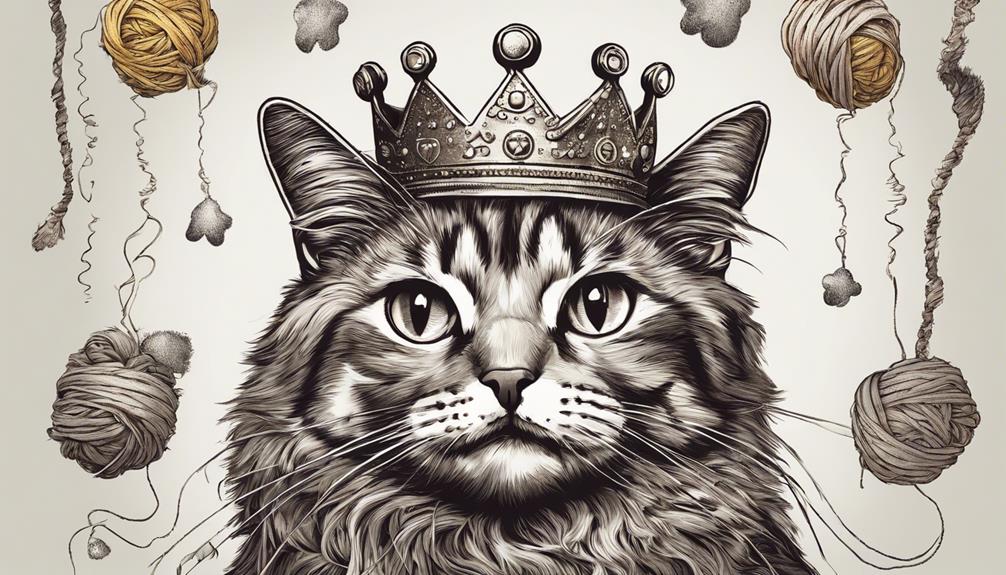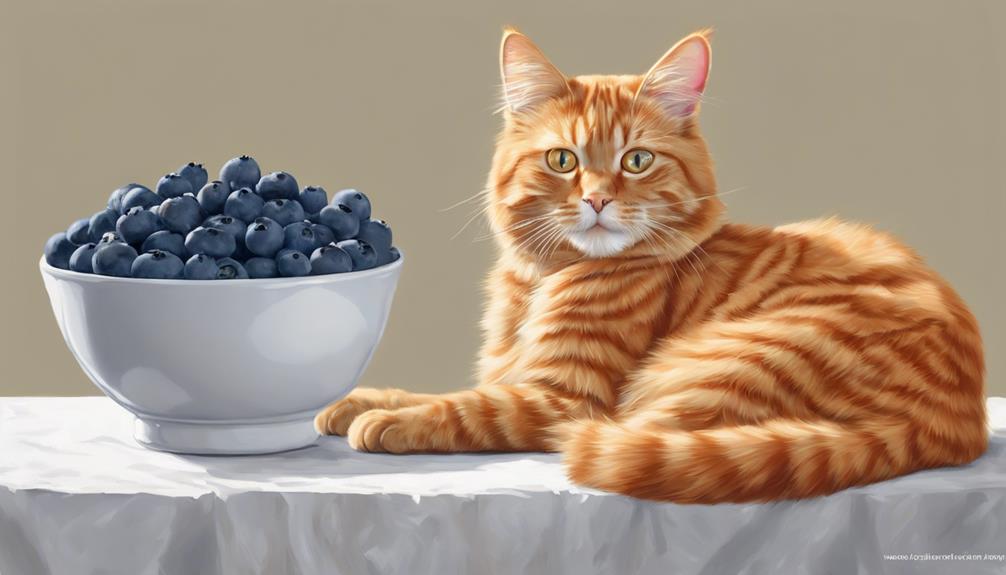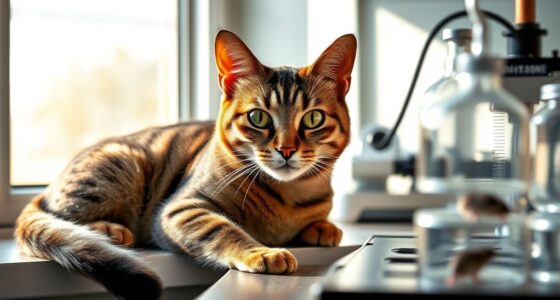When a cat drinks alcohol, their small bodies can't efficiently process it. This can lead to behavior changes, kidney or liver failure, and even death. Cats are more sensitive to alcohol than humans or larger animals. Alcohol poisoning symptoms in cats include increased thirst, lethargy, disorientation, and seizures. Immediate veterinary care is vital to address severe symptoms. Alcohol is quickly absorbed in cats, posing risks like seizures and respiratory distress. Even small amounts of alcohol can be toxic, potentially causing liver and brain damage. If alcohol ingestion is suspected, prompt attention from a vet is essential. Learn more about alcohol's impact on feline friends.
Key Takeaways
- Alcohol is highly toxic to cats due to their inefficient metabolism.
- Symptoms include increased thirst, lethargy, disorientation, and seizures.
- Alcohol is rapidly absorbed, leading to severe symptoms like respiratory distress.
- Alcohol ingestion can cause liver and brain damage in cats.
- Immediate veterinary care is crucial to address alcohol poisoning in cats.
Alcohol Toxicity in Cats
Alcohol toxicity in cats poses a serious threat to their health, potentially leading to severe consequences such as behavior changes, kidney or liver failure, and even death. Cats, being smaller than dogs, are more sensitive to alcohol. Their metabolism can't handle alcohol like humans or larger animals.
The symptoms of drunkenness in cats are important to recognize: increased thirst, lethargy, disorientation, tremors, and seizures. If you suspect your feline friend has ingested alcohol, prompt veterinary care is essential.
Our fur babies rely on us to keep them safe, so it's crucial to store alcohol securely and be cautious at gatherings where drinks might be spilled or left unattended. Being aware of the risks and symptoms can help prevent a potentially dangerous situation.
Signs of Alcohol Poisoning in Cats
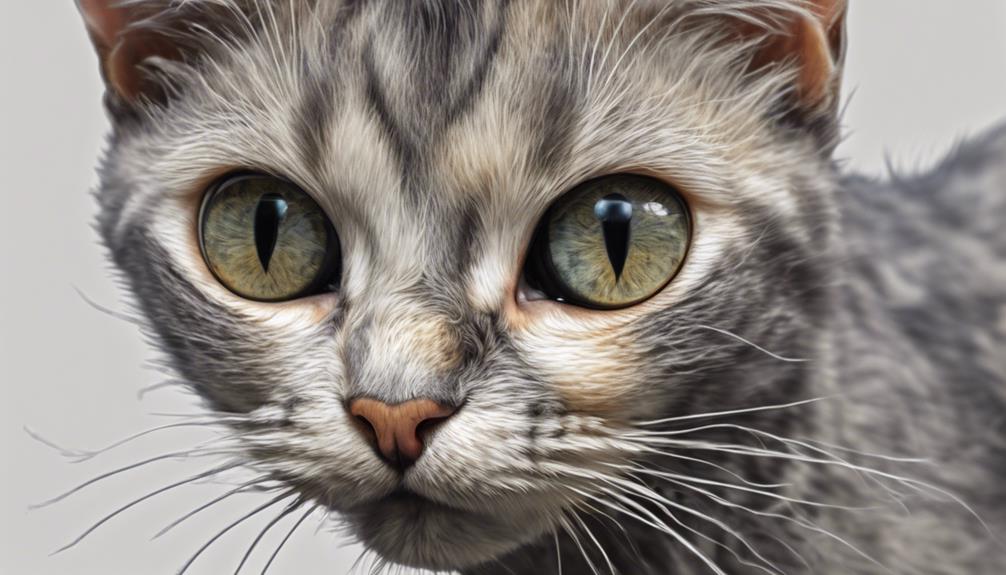
Recognizing the signs of alcohol poisoning in cats is vital for ensuring their well-being and prompt treatment. When it comes to Alcohol Poisoning in Cats, here are some Symptoms of Alcohol Poisoning to watch out for:
- Increased Thirst: Cats may exhibit excessive drinking after alcohol ingestion, leading to increased thirst as a potential sign of poisoning.
- Lethargy: A lethargic cat that's unusually tired or weak could be showing early signs of alcohol poisoning.
- Disorientation and Seizures: Cats experiencing disorientation, confusion, or seizures may be suffering from advanced stages of alcohol poisoning.
Cats' small bodies aren't equipped to process alcohol efficiently, making even a small amount of ingestion dangerous. Symptoms can escalate rapidly, leading to severe consequences like paralysis and shallow breathing. If you notice any of these signs or suspect that your cat has ingested alcohol, seek immediate veterinary care to safeguard their well-being and a speedy recovery.
Effects of Alcohol on Cats

Alcohol can have a severe impact on cats, causing symptoms of alcohol poisoning such as behavior changes and unconsciousness. If you suspect your cat has ingested alcohol, immediate veterinary care is essential to prevent potential fatality.
Understanding the effects of alcohol on cats can help you recognize the signs of intoxication and take prompt action to safeguard your pet's well-being.
Alcohols Impact on Cats
Upon consuming ethanol, cats experience a rapid onset of central nervous system depression. This can have serious consequences for our feline friends. Here are some important points to ponder:
- Quick Absorption: Cats absorb alcohol swiftly, leading to its rapid circulation in the bloodstream until metabolized by the liver.
- Severity of Signs: Signs of alcohol ingestion in cats can vary from mild to severe depending on the amount consumed.
- Potential Risks: Severe cases of alcohol ingestion in cats can result in seizures, respiratory distress, and even fatality. Additionally, alcohol consumption can pose risks of liver damage, brain damage, coma, and death.
It's vital to contemplate these effects to safeguard the well-being of our beloved cats.
Symptoms of Alcohol Poisoning
Experiencing symptoms of alcohol poisoning, cats may display increased thirst, lethargy, and disorientation after ingesting alcohol. Along with these signs, muscle tremors and seizures could also indicate alcohol poisoning in cats. It's important to recognize dangerous symptoms like shallow breathing and paralysis, which can result from alcohol ingestion.
If your cat shows tremors or disorientation, it might be suffering from alcohol poisoning. Keep a close eye out for increased thirst and seizures as well, as these could be red flags for intoxication. Understanding these symptoms can help you act quickly and seek appropriate veterinary care to safeguard your cat's well-being.
Veterinary Care for Intoxication
When addressing alcohol intoxication in cats, our veterinary care approach involves conducting blood tests to assess the severity of symptoms and providing necessary supportive therapies.
- We prioritize the well-being of your feline friend by closely monitoring their essential signs.
- Hospitalization may be necessary for more severe cases to guarantee round-the-clock care.
- Administering IV fluids helps to flush out the alcohol from their system and maintain hydration levels.
Alcohol poisoning in cats can manifest through various symptoms, such as disorientation, lethargy, and potentially even seizures. Prompt veterinary intervention is critical to evaluate the extent of alcohol ingestion and provide appropriate treatment. Recovery from alcohol intoxication varies based on the amount ingested, with severe cases posing a risk of fatality.
Alcohol Absorption in Cats

Alcohol absorption in cats occurs rapidly after ingestion, with the substance quickly entering their bloodstream. Even a small amount of alcohol can lead to poisoning in cats due to their relatively small size and inability to metabolize alcohol efficiently. The liver plays an important role in metabolizing alcohol in cats once it has been absorbed. Different types of alcohol, such as ethanol, methanol, and isopropyl alcohol, have varying toxicities in cats, with ethanol being the least toxic of the three.
Understanding how alcohol is absorbed in cats is essential in recognizing the potential dangers of alcohol ingestion. The effects of alcohol in cats depend on the quantity ingested, and alcohol absorption can result in a range of symptoms based on the amount consumed. Monitoring your cat's environment and ensuring that alcohol isn't accessible can help prevent accidental ingestion and potential harm to your feline friend.
Symptoms of Alcohol Ingestion in Cats
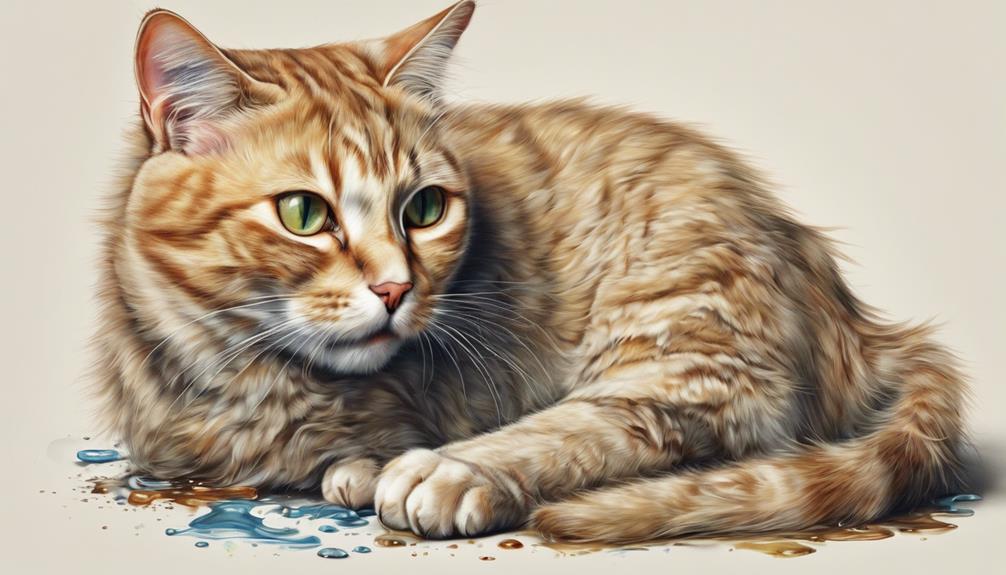
After discussing alcohol absorption in cats, it becomes evident that recognizing the symptoms of alcohol consumption in felines is crucial for prompt intervention and treatment.
When a cat consumes alcohol, the following symptoms may appear:
- Lethargy: Cats may seem unusually tired or sluggish, displaying a lack of energy or interest in their surroundings.
- Disorientation: Alcohol consumption can induce confusion and disorientation in cats, resulting in uncoordinated movements or difficulty finding their way.
- Seizures: One of the most severe symptoms, seizures in cats following alcohol consumption necessitate immediate veterinary attention to prevent further complications.
Monitoring your cat for signs of alcohol consumption, such as lethargy and disorientation, can aid in early detection and treatment. Remember, even a small amount of alcohol can have significant effects on cats due to their small size and sensitivity. If you suspect your cat has consumed alcohol and exhibits any of these symptoms, seek veterinary care promptly to safeguard their well-being.
Dangers of Alcohol for Cats
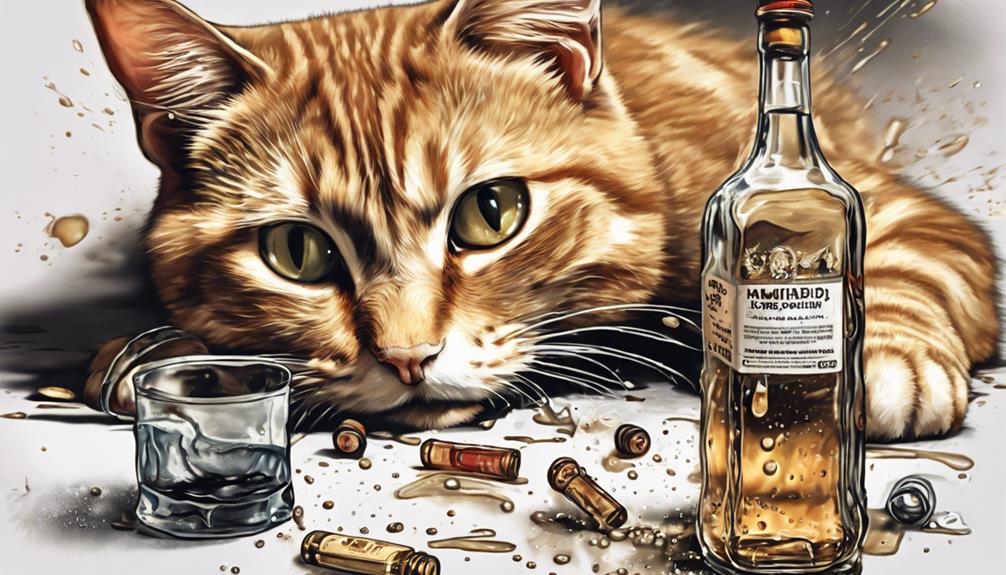
Alcohol can be extremely dangerous for cats, even in small amounts, as their bodies aren't equipped to process it. The liver and kidneys of cats are particularly sensitive to the toxic effects of alcohol.
What might seem harmless to us can be life-threatening to our feline friends.
Alcohol Toxicity in Cats
If a cat consumes alcohol, even in small amounts, it can quickly become toxic to their small bodies and metabolism. Alcohol can have severe consequences for cats, including behavioral changes, kidney or liver failure, and even death.
Here are three critical points to remember about alcohol toxicity in cats:
- Sensitivity: Cats are more susceptible to alcohol poisoning than dogs due to their smaller size and unique metabolism.
- Symptoms: Alcohol poisoning symptoms in cats may include increased thirst, lethargy, disorientation, tremors, and seizures.
- Urgency: Immediate veterinary care is essential if a cat ingests alcohol to prevent severe outcomes such as coma or fatality. Remember, even a small amount of alcohol can pose a significant risk to your feline friend.
Symptoms of Poisoning
When a cat consumes alcohol, the symptoms of poisoning can manifest in various ways, such as increased thirst, lethargy, disorientation, and muscle tremors. Even a small amount of alcohol can have serious consequences for our feline friends.
If you notice your cat displaying signs like shakiness, queasiness, or vomiting after potential exposure to alcohol, it's critical to seek veterinary care immediately. Lethargy, depression, and incoordination are common indicators of alcohol poisoning in cats, signaling a need for urgent attention.
These symptoms should never be taken lightly, as they can quickly escalate and pose significant risks to your cat's health. Remember, quick action and proper veterinary care are vital to guarantee the well-being of your furry companion.
Alcohol Metabolism in Cats
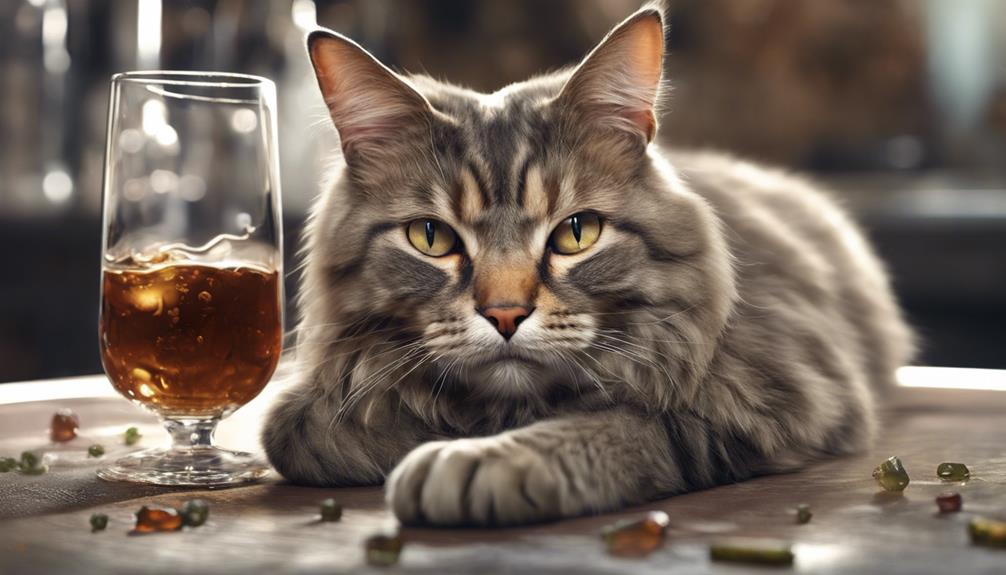
How do cats metabolize alcohol differently from humans? Cats lack the necessary enzymes to efficiently break down alcohol, unlike humans. This difference leads to some unique aspects of alcohol metabolism in felines:
- Rapid Absorption: Alcohol is swiftly absorbed into a cat's bloodstream, causing quick effects due to their limited ability to metabolize it effectively.
- Liver Processing: The liver is responsible for processing alcohol in cats, but their small size makes them more vulnerable to the toxic effects of alcohol, even in small amounts.
- Increased Sensitivity: Cats are more sensitive to the effects of alcohol compared to humans because of their unique metabolism. This sensitivity means that even small amounts of alcohol can have severe consequences for a cat's health.
Understanding these differences in alcohol metabolism highlights the importance of keeping alcoholic substances away from cats to prevent accidental ingestion and potential harm to our feline friends.
Diagnosis of Alcohol Ingestion in Cats
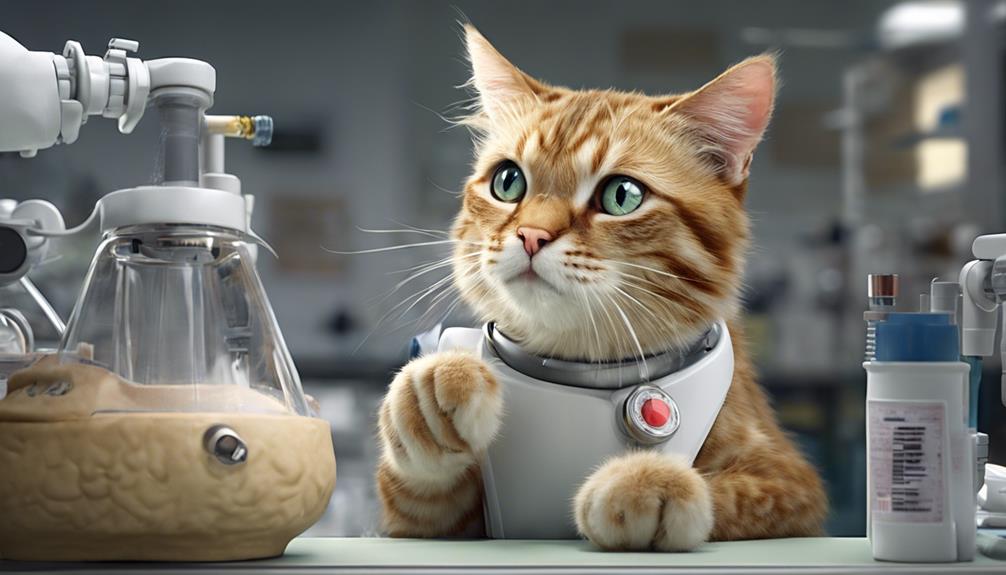
When diagnosing alcohol ingestion in cats, it's crucial to observe symptoms like disorientation, lethargy, and tremors. Veterinary professionals might perform blood tests to confirm the ingestion of alcohol in cats.
Recognizing behavioral changes and physical symptoms plays an essential role in diagnosing alcohol ingestion and providing timely treatment.
Symptoms of Alcohol Poisoning
Observing symptoms of alcohol poisoning in cats involves noting increased thirst, lethargy, and disorientation as potential indicators. When suspecting alcohol ingestion in your cat, pay attention to the following signs:
- Tremors and Seizures: Muscle tremors and seizures are common manifestations of alcohol poisoning in cats.
- Behavioral Changes: Confusion and incoordination are behavioral changes that can signal alcohol ingestion in cats.
- Physical Symptoms: Excessive drooling, vomiting, or difficulty breathing may also be signs of alcohol poisoning in cats.
If you notice any of these symptoms in your cat after a possible exposure to alcohol, contacting the pet Poison Helpline or seeking immediate veterinary care is essential for their well-being.
Treatment for Intoxication
In diagnosing alcohol ingestion in cats, veterinary examination, blood tests, and symptom observation are essential for confirming intoxication. If you suspect your cat has consumed alcohol, seeking prompt veterinary attention is pivotal.
Once at the veterinary clinic, they may administer IV fluids to help flush out the alcohol from your cat's system and provide supportive care. Blood tests can also help determine the level of alcohol in your cat's bloodstream, guiding the treatment plan. Observing symptoms like disorientation, lethargy, or tremors can further aid in confirming alcohol intoxication.
Treatment for Alcohol Poisoning in Cats
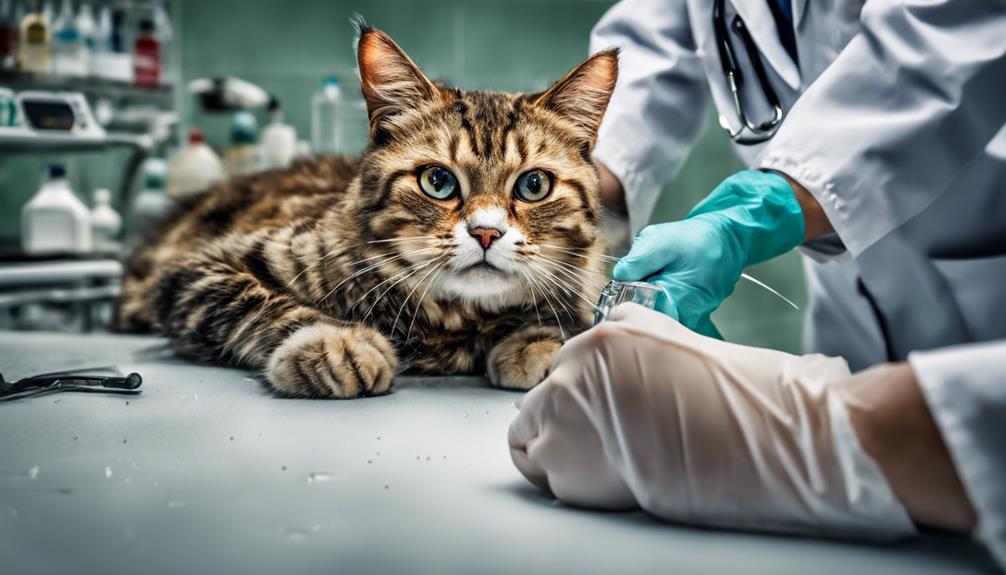
Seek immediate veterinary care if you suspect alcohol poisoning in your cat. When it comes to treating alcohol poisoning in cats, it's essential to act swiftly to guarantee the best possible outcome. Here are some key steps to take:
- Contact a Veterinarian: Reach out to a veterinarian immediately for expert advice on how to proceed. They'll provide guidance on the next steps to take based on the severity of the poisoning.
- Pet Poison Helpline: Consider contacting the Pet Poison Helpline for additional support and information. They can offer valuable insights and assistance in handling cases of alcohol poisoning in cats.
- Prompt Veterinary Attention: In cases of significant alcohol ingestion, prompt veterinary attention is vital for the best chance of recovery. Veterinarians can administer appropriate treatment to help your cat overcome alcohol poisoning.
Alcohol and Cat Organs
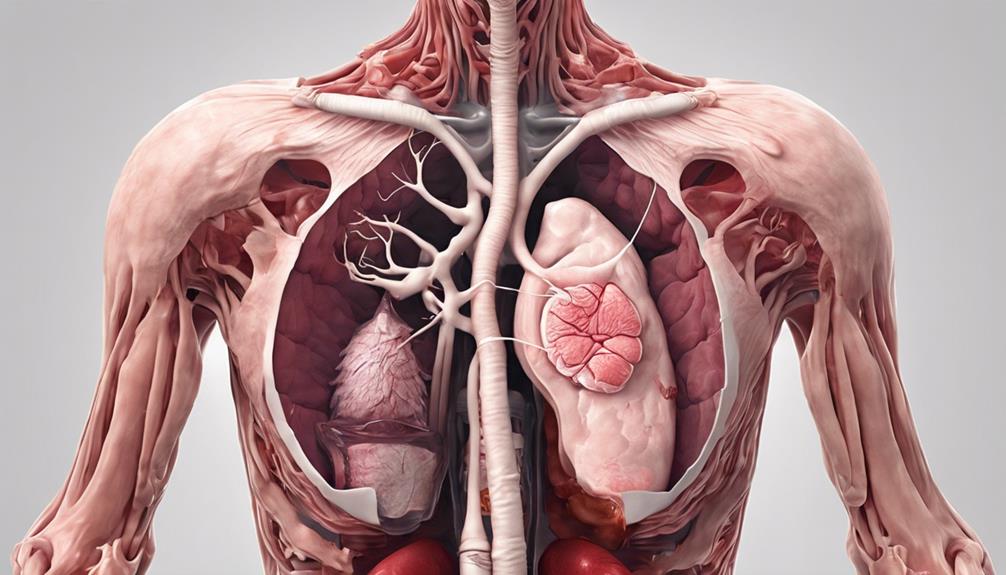
After addressing the treatment for alcohol poisoning in cats, it becomes evident that alcohol can severely impact a cat's liver and kidneys due to their small size and sensitivity. Cats lack the enzymes needed to efficiently break down alcohol, making even small amounts potentially fatal.
When a cat ingests alcohol, it can lead to organ damage, particularly affecting the liver, and in severe cases, result in liver failure. The kidneys, responsible for filtering toxins from the blood, are also at risk. Prompt veterinary care is essential as alcohol-induced organ damage can progress rapidly.
If you suspect your cat has consumed alcohol, watch for symptoms like vomiting, disorientation, and difficulty breathing. Remember, the consequences of alcohol ingestion can be dire, and delaying treatment may worsen the outcome.
Cat Alcohol Intoxication

Alcohol intoxication in cats can lead to a range of symptoms, including disorientation, lethargy, and muscle tremors. If a cat ingests alcohol, immediate veterinary care is essential to prevent serious health complications.
Treatment for alcohol poisoning may involve supportive care to manage symptoms and prevent further damage to the cat's organs.
Symptoms of Intoxication
Experiencing alcohol intoxication, cats may show signs of incoordination, weakness, and shakiness. When a cat drinks alcohol, the effects can manifest in various ways, such as:
- Gastrointestinal Distress: Cats may experience vomiting and stomach upset.
- Delirium: Confusion and disorientation can be observed in cats under the influence of alcohol.
- Lethargy and Depression: Cats may appear tired, lack energy, and display signs of sadness.
These symptoms serve as vital indicators of alcohol intoxication in cats. Recognizing these signs promptly is essential to guarantee the well-being of our feline companions.
Treatment for Alcohol Poisoning
Upon ingestion of alcohol, immediate veterinary intervention becomes essential to mitigate potential health risks for the affected cat. If a cat drinks alcohol, it can lead to alcohol poisoning, a serious condition requiring prompt treatment.
Once at the veterinary clinic, the cat may receive supportive care such as intravenous fluids to help flush out the toxins and medications to address symptoms like vomiting or seizures. Close monitoring is vital during the recovery process to guarantee the cat's stability and improvement.
With timely and appropriate care, cats can recover from alcohol poisoning, but it's vital to act quickly to prevent complications. Remember, alcohol and pets don't mix, so always keep these substances out of their reach to avoid such dangerous situations.
Alcohol-Related Risks for Cats

Due to their small size and heightened sensitivity, cats face significant risks when exposed to alcohol. Even a small amount of alcohol can be extremely perilous for our feline friends, potentially leading to serious consequences. Here are some risks to be aware of:
- Toxicity: Cats can easily be poisoned by alcohol due to their small size, making it imperative to keep all alcoholic beverages out of their reach.
- Organ Damage: Ingesting alcohol can harm a cat's organs, including the liver and kidneys, leading to long-term health issues.
- Behavioral Changes: Alcohol ingestion can cause cats to exhibit abnormal behaviors such as disorientation, lethargy, or even seizures, indicating a medical emergency.
It's essential to recognize the signs of alcohol poisoning in cats, such as tremors or increased thirst, and seek immediate veterinary attention if you suspect your cat has ingested alcohol. Ensuring a safe environment free from any alcohol can help prevent these serious risks and keep our beloved cats healthy and happy.
Alcohol Detection in Cats
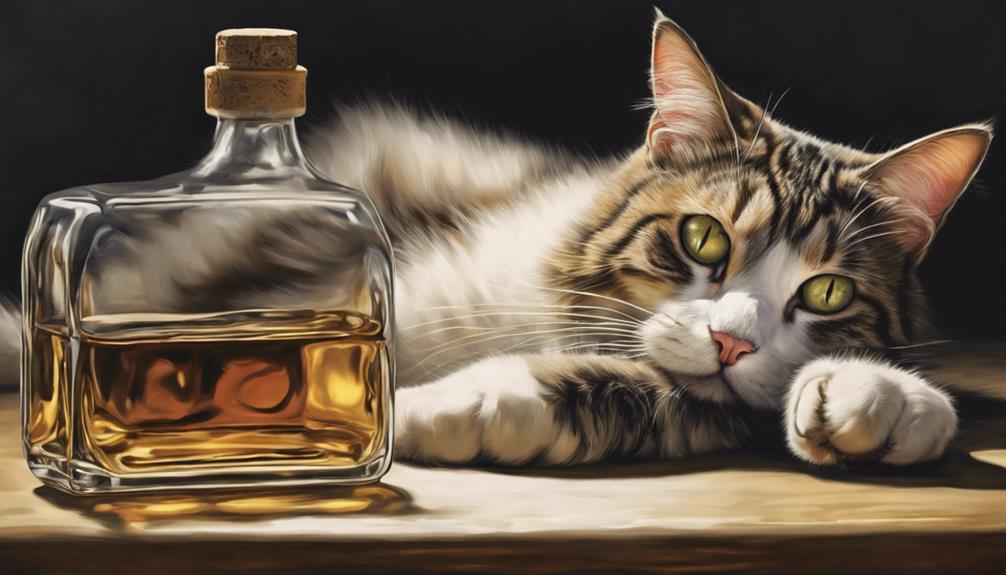
When it comes to cats and their interaction with alcohol, their keen sense of smell plays a pivotal role in detecting any presence of this substance. Cats have a remarkable ability to detect the smell of alcoholic beverages due to their sensitive noses. This heightened sense of smell allows them to pick up even faint traces of alcohol, which can lead to various reactions.
Some cats may be repelled by the smell of alcohol, causing them to avoid it altogether. On the other hand, some felines may display curiosity towards alcoholic beverages, intrigued by the unique scent it emits. When a cat ingests alcohol, their behaviors can vary widely based on individual preferences. Some may show signs of interest, while others may exhibit avoidance behaviors. Understanding how cats detect and respond to alcohol can help owners guarantee the safety and well-being of their feline companions.
Preventing Alcohol Ingestion in Cats

To prevent cats from ingesting alcohol, securely store all alcoholic beverages out of their reach. Here are some tips to help keep your feline friends safe:
- Store alcohol securely: Make sure all bottles, cans, and glasses containing alcohol are stored in cabinets or high places where cats can't access them. This simple step can prevent accidental ingestion.
- Be cautious during gatherings: When hosting parties or events where alcohol is present, be mindful of your cat's whereabouts. Keep an eye on them to guarantee they don't come into contact with any alcohol left unattended.
- Educate guests: Inform your guests about the dangers of pets consuming alcohol. Sometimes, visitors may unknowingly leave their drinks within a cat's reach. By spreading awareness, you can help prevent such incidents from happening.
Cat Alcohol Consumption Consequences
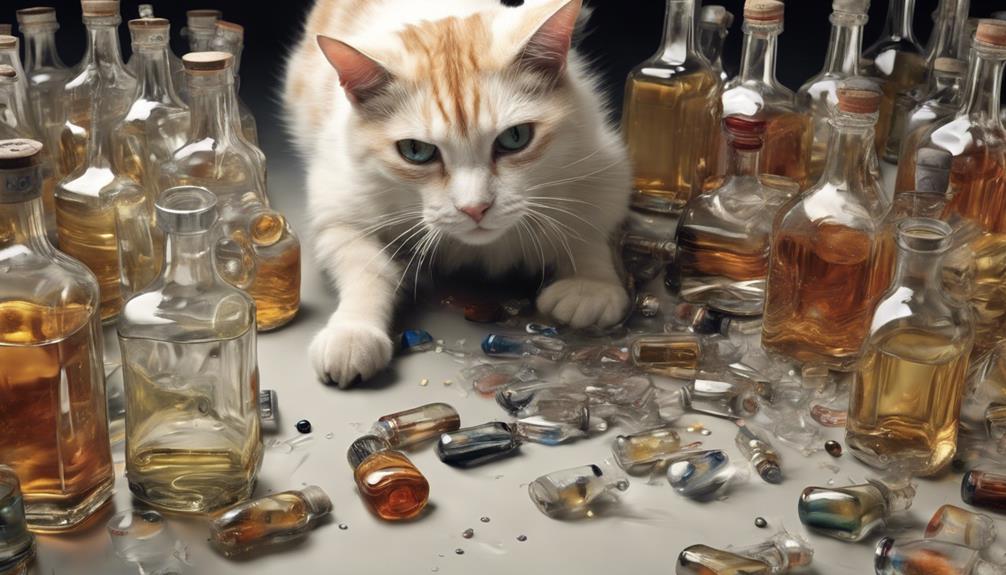
Experiencing behavior changes, unconsciousness, and serious health issues can occur in cats if they drink alcohol. Even a small amount of alcohol can be toxic to our feline friends, potentially leading to alcohol poisoning. This can result in severe consequences such as liver damage, brain damage, coma, and in extreme cases, death. Keep an eye out for symptoms like increased thirst, lethargy, disorientation, tremors, and seizures, which could indicate alcohol poisoning in cats.
If you suspect that your cat has ingested alcohol, immediate veterinary care is essential. The sooner your cat receives treatment, the better their chances of recovery. Remember, alcohol and cats simply don't mix. So, let's make sure that our curious companions stay away from any alcoholic beverages to keep them safe and healthy.
Preventing access to alcohol and being vigilant can go a long way in safeguarding our beloved feline friends from the dangers of alcohol consumption.
Frequently Asked Questions
What if My Cat Drinks Alcohol?
If our cat drinks alcohol, immediate vet attention is essential. Alcohol can cause severe health problems like behavior changes, organ failure, and even death in cats. Watch for signs like increased thirst, lethargy, and seizures.
What to Do if Cat Licks Alcohol?
If our cat licks alcohol, we must swiftly contact a veterinarian for immediate care. Alcohol poses serious risks to felines, leading to potential poisoning and severe health issues. Quick action is crucial for their well-being.
Can Cats Survive Alcohol?
We can't emphasize enough how dangerous alcohol is for cats. Even small amounts can be fatal due to their size and sensitivity. Immediate vet care is crucial to prevent serious harm and save their life.
Is It Bad for Cats to Smell Alcohol?
Smelling alcohol is important for cats. Did you know it can lead to serious health issues? It's vital to keep all alcohol products securely stored. We must protect our feline friends from harm.
Can Cats Drink Alcohol and Can It Affect Their Behavior?
While cats missing their owners may seek comfort in unusual ways, it’s important to note that they should never be given alcohol. Like humans, cats can suffer from alcohol poisoning, which can affect their behavior and even be fatal. It’s best to keep any alcohol away from pets altogether.
Conclusion
To sum up, alcohol is highly toxic to cats and can have serious consequences if ingested. It's vital to keep all alcoholic beverages out of reach of your furry friends to prevent accidental consumption.
Remember, when it comes to alcohol and cats, it's better to be safe than sorry. As the saying goes, 'Curiosity killed the cat,' so let's keep our feline friends safe and away from any alcohol at all times.



